Controlling the Assault of Non-solicited Pornography and Marketing (CAN-SPAM) Act, 2003
- The law details the national standards for sending e-mails (commercial ones);
- The permission of FTC must be granted so that the law could be executed;
- The regulation aims at controlling the online safety rates and preventing the instances of spamming;
- Thus, cybersecurity of the Internet users is increased significantly (Eastton & Taylor, 2011).
There is no need to stress that commercial e-mails often cross line between advertising and spamming. Therefore, online users have the right to be guarded against the abuse of the principles of advertising. The law, in its turn, sheds light on the ways, in which people can enjoy a safer internet environment by restricting power abuse to a considerable extent.
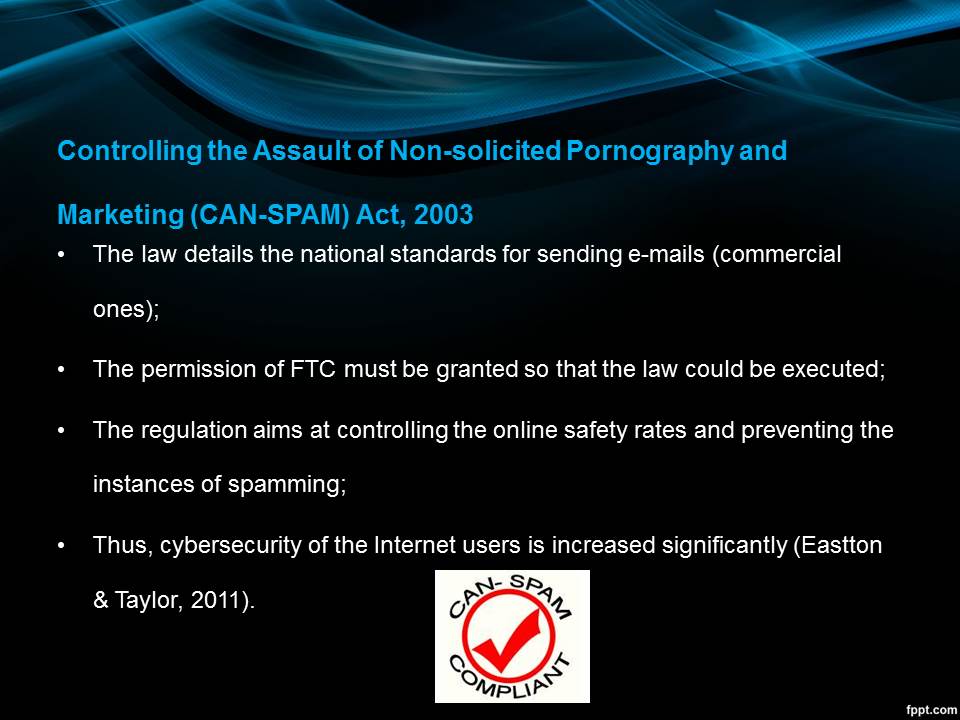
Uniting and Strengthening America by Providing Appropriate Tools Required to Intercept and Obstruct Terrorism Act (US Patriot Act), 2001, renewed 2006
- Also known as the Patriot Act, the legislation enhances the users’ security;
- The Patriot Act is supposed to play the role of the tool that guards internet users against the threat of terrorism;
- The provisions of the Act include a detailed analysis of the domestic and business use of the Internet, surveillance of the interactions carried out online, etc.;
- Despite its efficacy, the law has caused a range of controversies (e.g., the copyright issue) (Fischer, 2013).
The Patriot Act has sparked some of the greatest copyright-related conflicts online, beginning the era of copyright claims and numerous lawsuits.
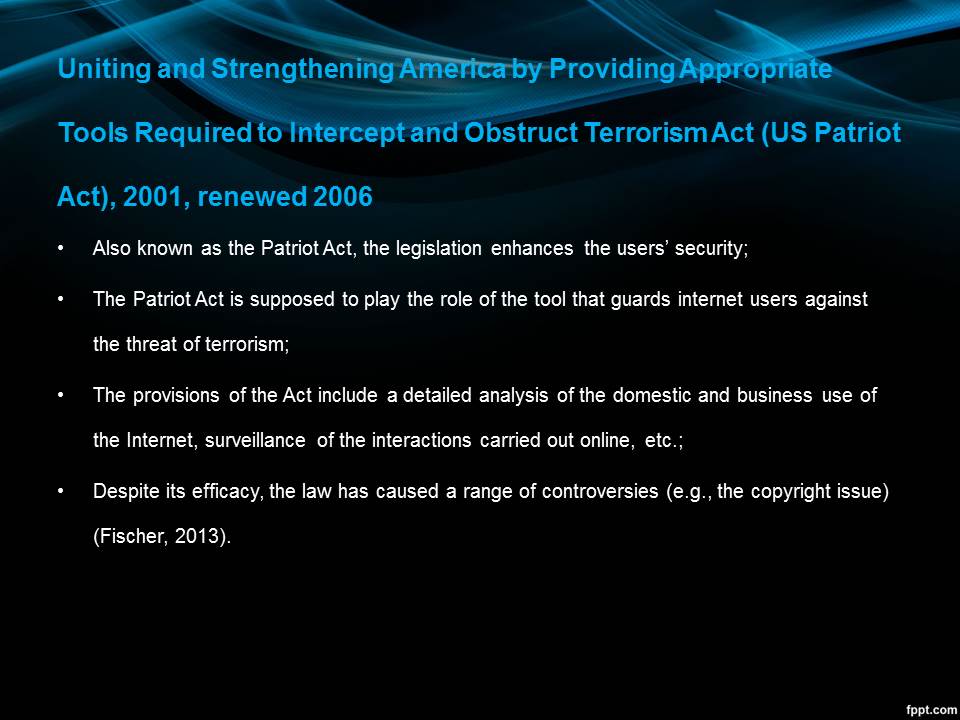
Children’s Internet Protection Act, 2000
- Harmful online content accessible by everyone is one of the scourges of the contemporary Internet environment (Whitman & Mattord, 2011);
- Children’s Internet Protection Act, 2000 demands that educational facilities for children should filter the content that the students can access;
- Thus, it is possible to prevent harmful imagery, text, and other types of data from being exposed to children and underage students;
- E-Rate system was developed so that K-12 schools could use it in their educational environment (Spacey, Cake, Muir, & Creaser, 2015).
One could argue, though, that the legislation has several dents. The availability of numerous ways of avoiding filters is one of them.
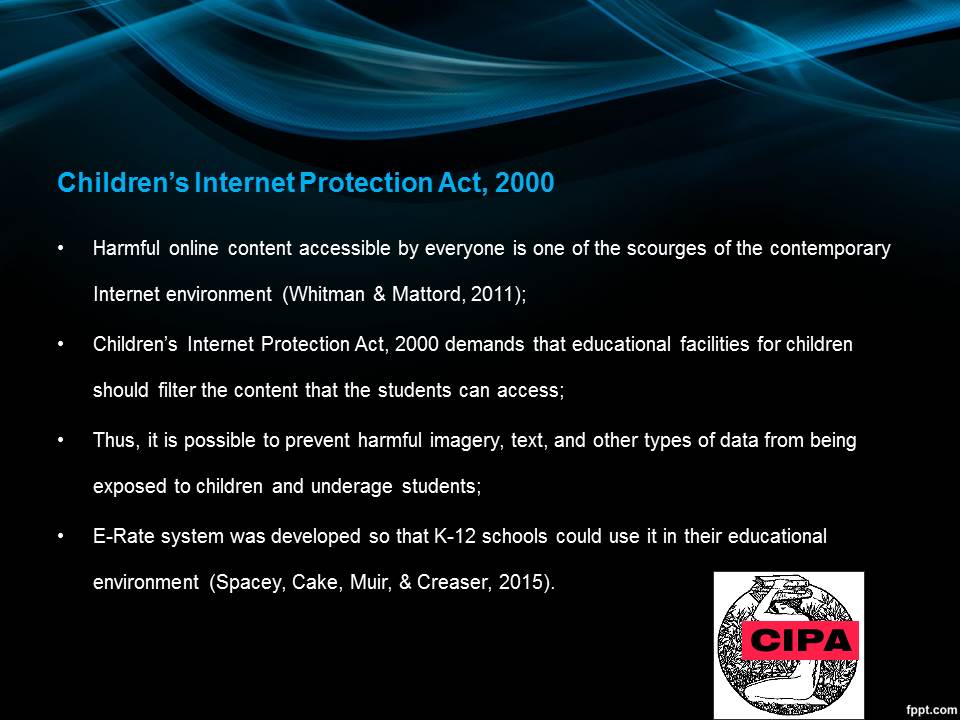
Financial Services Modernization Act, 1999
- Adopted by the U.S. Congress in 1999;
- Removed restrictions in commercial operations and transactions between organizations;
- Was waived temporarily due to the conflict with the postulates of the Glass-Steagall Act;
- Reinforced the concept of financial privacy of organizations;
- Allegedly contributed to the creation of the environment, in which financial fraud became a possibility (Partching & Hurst, 2013).
Commonly known under the title of the Gramm–Leach–Bliley Act (GLBA), the regulation serves as the tool for improving the financial operations in companies. The Act removed some of the limitation that the Glass-Steagall Act of 1933 imposed on the operations of companies in the U.S.
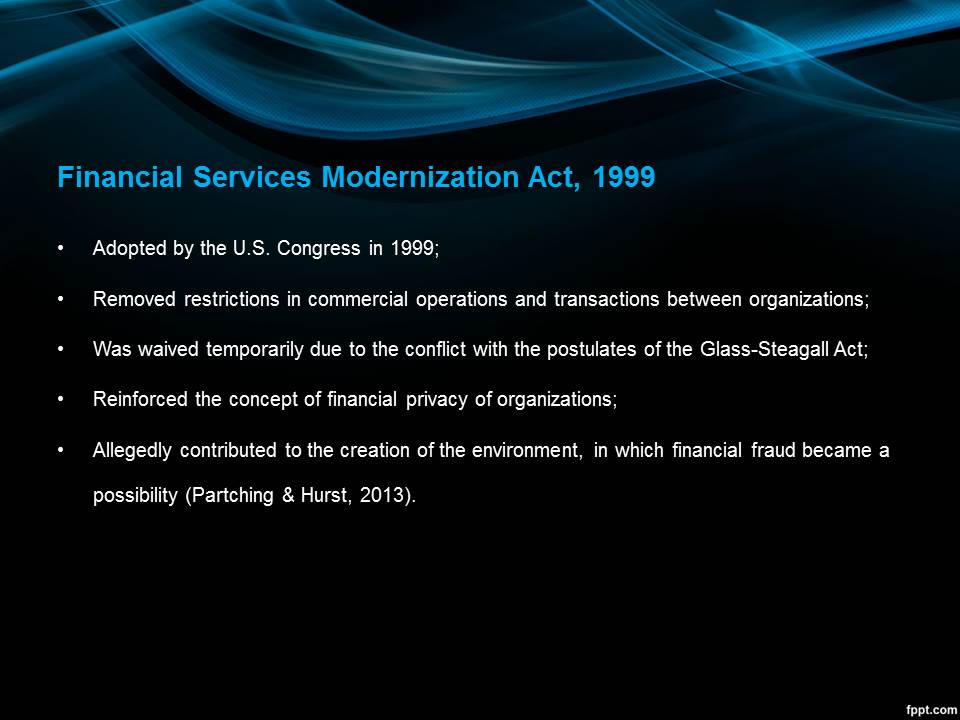
Children’s Online Privacy Protection Act (COPPA), 1998
- Federal law aimed at protecting children aged 13-18 or 13-21 (depending on the legal age standards accepted in the state);
- Regulation incorporating detailed guidelines regarding the provision of safe content for the children that have the access to the Internet;
- Legislation suggesting that sites with corresponding content for mature and adult audiences should restrict the information provided to the users that are under age;
- Requiring considerable support and cooperation of parents (Federal Trade Commission, 2015).
Though clearly being a decent initiative, COPPA is likely to be replaced with a newer and a less flexible framework as the former needs active participation of parents, which cannot be guarantee don a number of occasions.
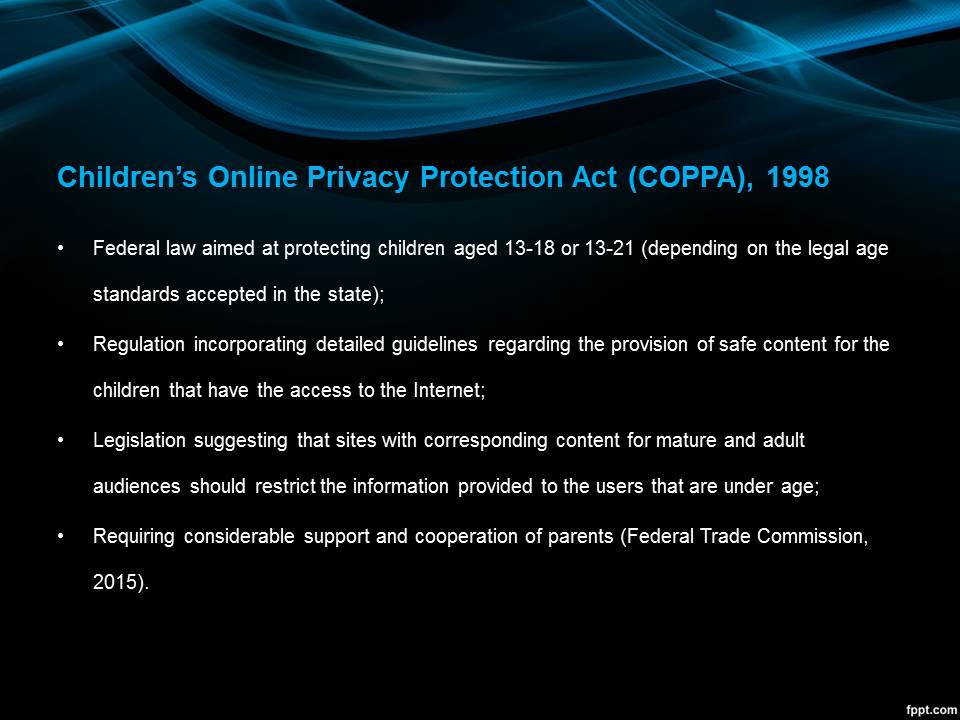
No Electronic Theft (NET) Act, 1997
- Issued in 1997, the NET Act prevents people from engaging in criminal online activities that involve illegal use of any form of content that belongs to other people.
- The act was one of the first few regulations that addressed online theft (i.e., the theft carried out on the Internet) as a crime and, therefore, the action deserving a corresponding punishment;
- The Act also implies that the accused should provide a financial compensation to the people whose rights were infringed.
Online piracy has become a major issue in the contemporary society. The NET Act was one of the first attempts at addressing the problem.
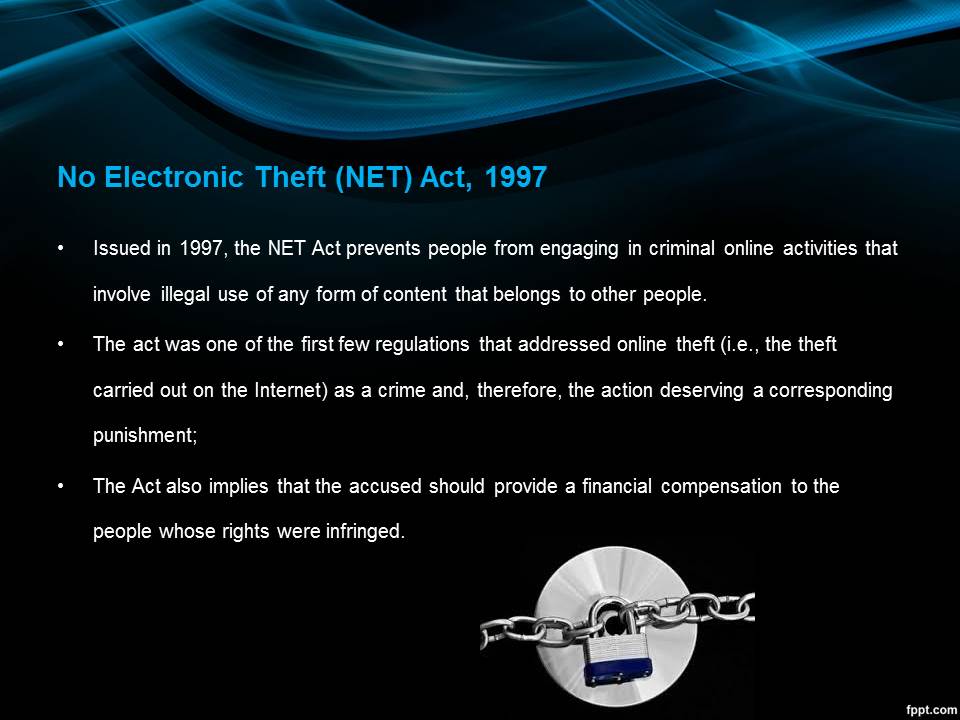
Health Insurance Portability and Accountability Act (HIPAA), 1996
Primary goal: protecting the people that are under the threat of losing a job.
Focus: group health acts improvement:
- provision of their affordability;
- Inclusion of new social groups that are in the risk category;
- Direction: improving the quality of services by preventing the instances of fraud and abuse in the healthcare and nursing domain;
- Possible issues: problems in retrieving official data due to the intricate system and the increasing rate of bureaucracy.
HIPAA can be considered one of the basic tools that allow for a compensation for the people that have suffered negative changes in their lives.
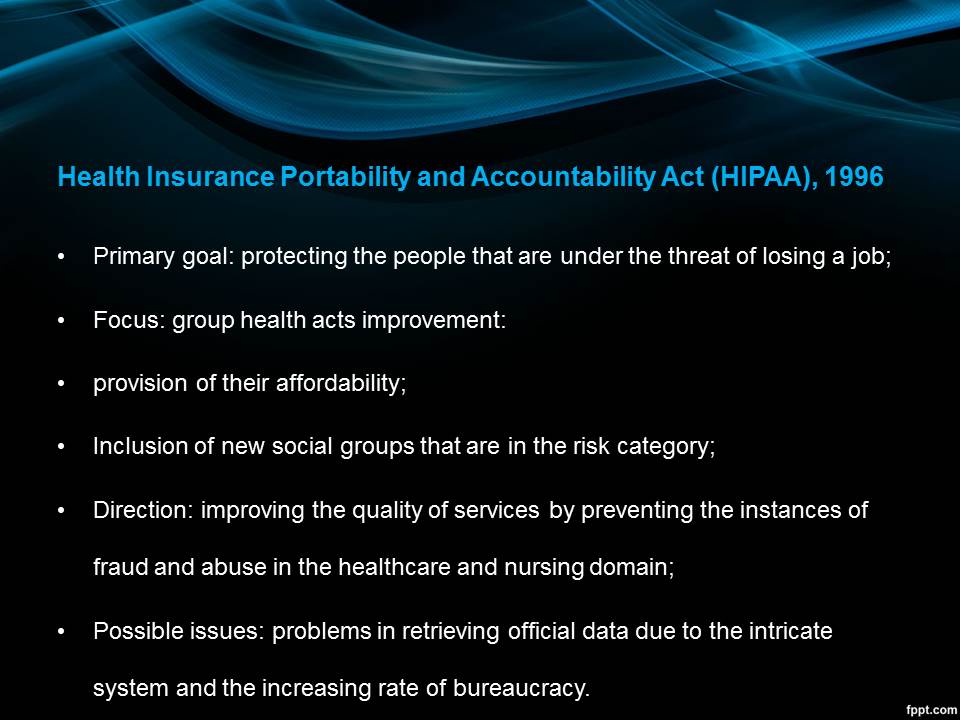
Telephone Consumer Protection Act (TCPA), 1991
- Passed during Bush’s presidency and addressing the loopholes in the Communications Act of 1934, the regulation created premises for protecting the users from:
- Telemarketing as one of the tools that affect customers directly with solicitations;
- Spam SMS text messages, MMS messages and fax machine messages;
- Created premises for securing the users’ personal data, including their names, addresses, etc., thus, helping avoid fraud.
Though having its imperfections, TCPA clearly is efficient in fighting the annoying and often illegal solicitations that companies use as the means of attracting new customers. It serves as the means of securing people from the annoying endeavors of business companies to be obtrusive in the marketing of their services.
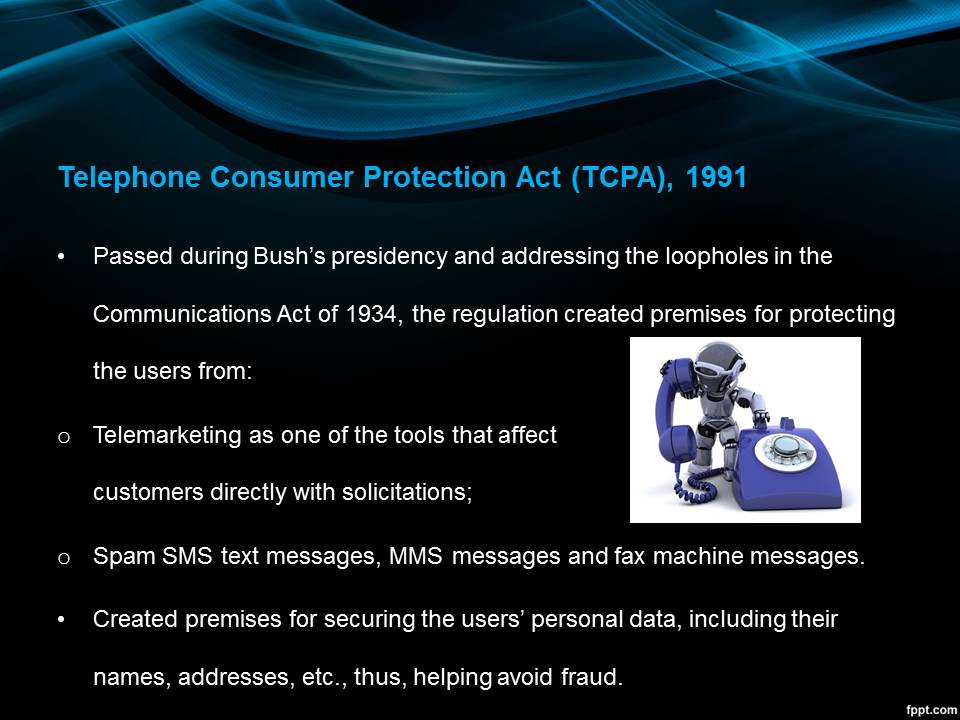
Reference List
Federal Trade Commission. (2015). Complying with COPPA: Frequently asked questions. Web.
Fischer, E. A. (2013). Federal laws relating to cybersecurity: Overview and discussion of proposed revisions. Web.
Eastton, C., & Taylor, J. (2011). Computer crime, investigation, and the law. Boston, MA: Course Technology, Cengage Learning.
Partching, R., & Hurst, M. (2013). Journalism ethics: Arguments and cases for the twenty-first century. New York, NY: Routledge.
Spacey, R., Cake, L., Muir, A., & Creaser, M. (2015). Regulating use of the internet in public libraries: a review. Journal of Documentation, 70(3), 478–497.
Whitman, M. E., & Mattord, H. (2011). Reading & Cases in Information Security: Law & Ethics. Boston, MA: Course Technology, Cengage Learning.